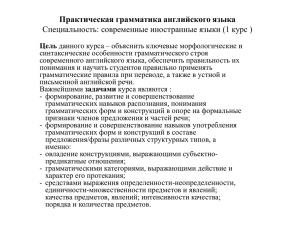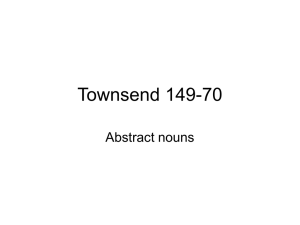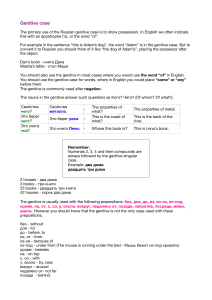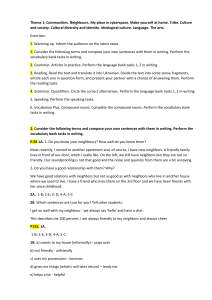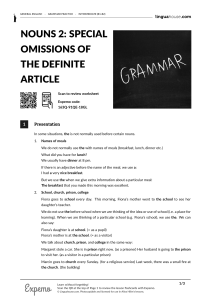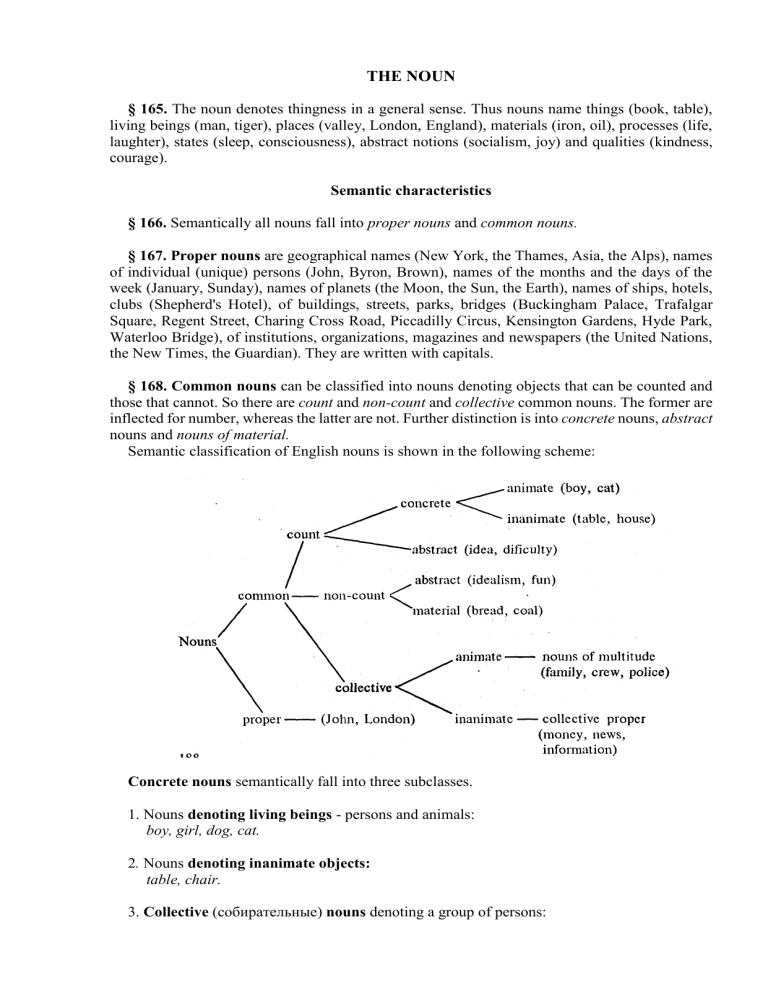
THE NOUN § 165. The noun denotes thingness in a general sense. Thus nouns name things (book, table), living beings (man, tiger), places (valley, London, England), materials (iron, oil), processes (life, laughter), states (sleep, consciousness), abstract notions (socialism, joy) and qualities (kindness, courage). Semantic characteristics § 166. Semantically all nouns fall into proper nouns and common nouns. § 167. Proper nouns are geographical names (New York, the Thames, Asia, the Alps), names of individual (unique) persons (John, Byron, Brown), names of the months and the days of the week (January, Sunday), names of planets (the Moon, the Sun, the Earth), names of ships, hotels, clubs (Shepherd's Hotel), of buildings, streets, parks, bridges (Buckingham Palace, Trafalgar Square, Regent Street, Charing Cross Road, Piccadilly Circus, Kensington Gardens, Hyde Park, Waterloo Bridge), of institutions, organizations, magazines and newspapers (the United Nations, the New Times, the Guardian). They are written with capitals. § 168. Common nouns can be classified into nouns denoting objects that can be counted and those that cannot. So there are count and non-count and collective common nouns. The former are inflected for number, whereas the latter are not. Further distinction is into concrete nouns, abstract nouns and nouns of material. Semantic classification of English nouns is shown in the following scheme: Concrete nouns semantically fall into three subclasses. 1. Nouns denoting living beings - persons and animals: boy, girl, dog, cat. 2. Nouns denoting inanimate objects: table, chair. 3. Collective (собирательные) nouns denoting a group of persons: family, crowd. There are some nouns which may be classified both as count and non-count. They often have considerable difference in meaning in the two classes. Count nouns He used to read an evening paper. She was a beauty. They hoped to have pleasant experiences. I saw him in a group of youths. Non-count nouns They wrappped up the present in brown paper. Beauty is to be admired. He has a great deal of experience. Vie was speaking with the enthusiasm of youth. A noun of material used as a count noun undergoes a semantic change so as to denote: kind of, type of: He found her drinking Chinese tea, which she didn't like — but what could one do, other teas were common. The same can be seen in the title A. Conan Doyle devised for a story "Upon the Distinction Between the Ashes of the Various Tobaccos". Morphological composition § 169. According to their morphological composition nouns can be divided into simple, derived, and compound. Simple nouns consist of only one root-morpheme: dog, chair, room, roof, leaf. Derived nouns (derivatives) are composed of one root-morpheme and one or more derivational morphemes (prefixes or suffixes). The main noun-forming suffixes are those forming abstract nouns and those forming concrete, personal nouns. Abstract nouns -age: leakage, vicarage -al: betrayal, portrayal, refusal -ancy/-ency: vacancy, tendency -dom:freedom kingdom -hood: brotherhood, childhood -ing: meaning, cleaning -ion/~sion/-tion/-ation: operation, tension, examination -ism: darvinism, patriotism -ment: agreement, unemployment -ness: darkness, weakness -ship: friendship, membership -ty: cruelty, sanity, banality -th: growth, strength -y: difficulty, honesty Concrete nouns -(i)an: physician, Parisian, republican -ant/-ent: assistant, student, informant -arian: vegetarian -ее: refugee, employee, payee -er: teacher, worker, singer -ician: musician, politician -ist: socialist, artist -or: visitor, actor -let: booklet, leaflet -ess: actress, tigress, waitress -ine: heroine -ix: proprietrix -ette: usherette The four suffixes -ess, -ine, -ette are fem Sometimes nouns formed by abstract noun suffixes may come to denote concrete things or persons as in translation (a process and its result), beauty (may denote an abstract notion and a beautiful woman). Compound nouns consist of at least two stems. The meaning of a compound is not a mere sum of its elements. The main types of compound nouns are: noun stem + noun stem: seaman (моряк), airmail (авиапочта) bluebell (колокольчик), blackbird (черный дрозд) verb stem + noun stem: pickpocket (карманный вор) gerund + noun stem: looking-glass (зеркало), dancing-hall (танцевальный зал) noun stem + prepositions + noun stem: father-in-law (свекр, тесть) mother-in-law (свекровь, теща) man-of-war (военный корабль) substantivised phrases: forget-me-not (незабудка), pick-me-up (тонизирующий напиток) adjective stem + noun stem: Morphological characteristics § 170. Morphologically nouns are characterized by the grammatical categories of number and case. Gender does not find regular morphological expression. The distinction of male, female, and neuter may correspond to the lexical meaning of the noun: masculine (names of male beings) - boy, man, husband, bachelor, ox, cock; feminine (names of female beings) - girl, woman, wife, maid, cow, hen; neuter (names of inanimate objects) - table, house. The distinction may be also expressed by word-formation of different types: a) feminine suffixes -ess (actress, hostess, poetess, tigress), -ine (heroine), -ette (usherette); b) compounds of different patterns: noun + noun stem Tom-cat - Tabby-cat doctor - woman-doctor dog-otter - bitch-otter male-frog - female-frog cock- hen-pheasant pheasant pronoun + noun stem he-wolf - she-wolf he-cousin - she-cousin There are also some traditional associations of certain nouns with gender. These are apparent in the use of personal or possessive pronouns: a) moon and earth are referred to as feminine, sun as masculine: It is pleasant to watch the sun in his chariot of gold and the moon in her chariot of pearl. At first the earth was large, but every moment she grew smaller. b) the names of vessels (ship, boat, steamer, ice-breaker, cruiser, etc.) are referred to as feminine: The new ice-breaker has started on her maiden voyage. She is equipped with up-to-date machinery. c) the names of vehicles (car, carriage, coach) may also be referred to as feminine, especially by their owners, to express their affectionate attitude to these objects: She is a fine car. d) the names of countries, if the country is not considered as a mere geographical territory, are referred to as feminine: England is proud of her poets. But: If the name of the country is meant as a geographical one the pronoun it is used. Iceland is an island, it is washed on three sides by the Atlantic Ocean. The category of number § 171. English nouns that are inflected for number (count nouns) have singular and plural forms. Singular denotes one, plural denotes more than one. Most count nouns are variable and can occur with either singular or plural number. In Modern English the singular form of a noun is unmarked (zero). The plural form is marked by the inflexion -(e)s. The spelling and the pronunciation of the plural morpheme vary. § 172. Regular plurals I. Nouns ending in vowels and voiced consonants have the plural ending pronouced as [z]: bee - bees [bi:z], dog - dogs [dɔgz] II. Nouns ending in voiceless consonants have a voiceless ending: book - books [buks] III. Nouns ending in -s, -sh, -as, -ch, -x, -z, (sibilants) have the ending [iz]: actress - actresses ['æktrɪsɪz] bush - bushes ['bu∫ɪz] watch - watches ['wot∫ɪzj box - boxes ['boksɪz] IV. Nouns ending in -o have the ending [z]: hero - heroes ['hɪǝrouz] photo- photoes ['foutouz] The regular plural inflexion of nouns in -o has two spellings; -os which occurs in the following cases: a) after a vowel - bamboos, embryos, folios, kangaroos, radios, studios, zoos; b) in proper names - Romeos, Eskimos, Filipinos; c) in abbreviations, kilos (kilogramme), photos (photograph), pros (professional); d) also in some borrowed words: pianos, concertos, dynamos, quartos, solos, tangos, tobaccos. In other cases the spelling is -oes: tomatoes, echoes, Negroes, potatoes, vetoes, torpedoes, embargoes Note: Some nouns may form their plural in either way: oes/os: cargo(e)s, banjo(e)s, halo(e)s. V. The letter -y usually changes into -i: sky skies [skaiz] But the letter -y remains unchanged -ys: a) after vowels: days (except in nouns ending in -quy: soliloquy - soliloquies). b) in proper names: the two Germanys, the Kennedys, the Gatsbys; c) in compounds: stand-bys, lay-bys. The word penny has two plural forms: pence (irregular) - in British currency to denote a coin of this value or a sum of money: Here is ten pence (in one coin or as a sum of money); pennies (regular) - for individual coins. Here are ten pennies. VI. Thirteen nouns ending in -f(e) form their plural changing -f(e) into -v(e): the ending in this case is pronounced [z]: calf - calves elf - elves half - halves knife - knives leaf - leaves life - lives loaf - loaves self - selves sheaf - sheaves (снопы) shelf – shelves thief - thieves wife - wives wolf - wolves Other nouns ending in -f(e) have the plural inflexion -s in the regular way: proof - proofs, chief - chiefs, safe - safes, cliff - cliffs, gulf - gulfs, dwarf - dwarfs, reef- reefs, grief - griefs; the ending is pronounced [s]. In a few cases both -fs and -ves forms are possible: scarf - scarfs/scarves, dwarf - dwarfs/dwarves, hoof - hoofs/hooves. VII. Nouns ending in -th after a short vowel have the ending -s [s]: month — months [mʌnθs]. Nouns ending in -th after a long vowel or a diphthong have [9z] in the plural: baths [ba:ðz], paths [paðz], oaths [ouðz]. But: youths [ju:θs], births [bǝ:θs]. VIII. The plural of abbreviations is sometimes formed in spelling by doubling a letter: Ms (manuscript) p. (page) Mr (Mister) M.P. (Member of Parliament) M.D. (Doctor of Medicine) Co. (Company) - MSS - pp. - Messrs ['mesǝz] - M.P.s ['em'pi:z] - M.D.s ['em'di:z] - Co.s [kouz] In a phrase like "Miss Brown" two different forms are used for the plural. We may either say "the Miss Browns" or "the Misses Brown", the latter being generally considered more correct. Irregular plurals § 173. For historical reasons certain nouns form their plural differently. 1. Seven nouns distinguish plural from singular by vowel change: man - men woman - women tooth - teeth foot – feet goose - geese mouse - mice louse - lice 2. Two nouns have -en to mark the plural: ox - oxen, child - children. Brother has two plural forms: brothers and brethren, the latter being used as a religious term or in elevated style to denote people of the same creed, not relations. 3. With some nouns the plural is identical with the singular form (for details see § 176, II): a) sheep-sheep (овца/ы); swine - swine (свинья/и); deer - deer (олень/и); grouse - grouse (куропатка/и). This sheep looks small. All those sheep are good. I bought a grouse (three grouse for dinner). There’re so many fish, they splinter the paddles. Note: There, are some animal names that have two plurals: fish - fish/fishes, pike - pike/pikes, trout - trout/trouts, carp –carp/carps, salmon - salmon/salmons. The zero plural is more common to denote hunting quarries (We caught only a few fish. We caught five s He shot quail (перепелок) to make money), whereas the regular plural is used to denote different indiv species, kinds of animal, especially fish with the same name or insects or other small animals which cause d or damage. The plant was covered in greenfly. This animal is infected with hookworm. There are three greenflies on my hand. Two large hookworms were found in his stomach. There were two quails for sale. b) identical singular and plural forms are also typical of nationality nouns in -ese, -ss: Chinese, Japanese, Portuguese, Swiss. We met a Japanese. We met many Japanese on our holiday. Note: The word for people of the country is the same as the plural noun; the other way is to use substantivized adjectives in this sense: Englishmen - the English Dutchmen - the Dutch. c) two nouns borrowed from Latin and one from French also have identical forms for singular and plural: series - series (ряд, серия); species - species (вид, порода, род) corps [ko:] - corps [ko:z] (корпус, род войск). d) names, indicating number, such as: pair, couple, dozen, score (два десятка), stone (мера веса: 14 англ. фунтов = 6,35 кг) and head (голова - поголовье скота) have the same form for both the singular and plural when they are preceded by a numeral, that is, they function as an indication of a kind of measure: two dozen of handkerchiefs, five dozen of eggs. The child weighs two stone. One thousand head of cattle. But when they have no number as predeterminer they take the usual plural form: dozens of times, to go in pairs. 4. A number of foreign (particularly Latin and Greek) nouns have retained their original plural endings. Loans of Greek origin Singular Plural -is [ɪs] basis crisis analysis thesis parenthesis axis hypothesis diagnosis -es [i:z] bases crises analyses theses parentheses axes hypotheses diagnoses -on [ǝn] criterion phenomenon -а [ǝ] criteria phenomena -а [ǝ] miasma -ata [ǝtǝ] miasmata Loans of Latin origin -us [ǝs] -i [ai] -ога [ǝrǝ] stimulus nucleus radius corpus genus -era [ǝrǝ] stimuli nuclei radii corpora genera -а [ǝ] formula antenna vertebra -ае [i:] formulae (or regular - formulas) antennae vertebrae -um [ǝm] datum stratum erratum -a [ǝ] data strata errata -es,-ix [ɪks] index appendix matrix -ices [ɪsi;z] indices appendices matrices Other loan nouns [i:z] or indexes or appendixes or matzixes Fr. -ean [ou] tableau bureau -eaux [ouz] tableaux bureaux (or bureaus) It.-o [ou] tempo -i [i] tempi (or tempos) As can be seen from the above list some loan nouns may have two plural forms: the English plural and the original foreign one: memorandum memoranda memorandums curriculum curricula curriculums formula formulae formulas cherub cheribum cherubs focus foci focuses There is a tendency to use the regular English plural forms in fiction and colloquial English and the foreign plural in academic or learned language. Sometimes different plural forms have different meanings: index indexes (list of contents of books) indices (a mathematical term - показатель) genius geniuses (men of talent) genii (fabulous spirits guarding a place - духи, домовые) § 174. Plural in compound nouns 1. As a rule in compounds it is the second component that takes the plural form: housewives, tooth-brushes, boy-scouts, maid-servants. 2. Compounds in -ful have the plural ending at the end of the word: handfuls, spoonfuls, mouthfuls, (though spoonsful and mouthsful are also possible). 3. Compounds in which the first component is man or woman have plurals in both first and last components: men-servants, women-doctors, gentlemen-farmers. 4. Compounds ending in -man change it into -men in spelling. In pronunciation, however, there is no difference between the singular and plural forms, both having [ǝ]: policeman [ǝn] - policemen [ǝn]. Such nouns as German, Roman, Norman are not compounds, and therefore they have regular plurals: Germans, Romans, Normans. 5. In compounds originating from a prepositional noun phrase where the preposition is a linking element only the first noun takes the plural form: editors-in-chief, mothers-in-law, (военные корабли). commanders-in-chief, coats-of-mail, men-of-war 6. In compounds with a conjunction as a linking element the plural is taken by the second noun: gin-and-tonics. 7. In compound nouns formed by a noun plus a preposition, or an adverb, or an adjective only the first element takes the plural: passers-by, lookers-on, courts-martial, attorneys-general. 8. When the compound is a substantivized phrase which does not contain a noun, the last element takes the plural ending –s: forget-me-nots, breakdowns, stand-bys, grown-ups, close-ups, pick-ups (случайные знакомства), drop-outs (дезертиры), go-betweens (посредники). Invariable nouns Invariable nouns cannot change their number, some of them are always singular in meaning (linguistics, news), some denote plurality (cattle, police). § 175. Singular invariable nouns. 1. Here belong all non-count nouns: a) material nouns - tea, sugar, gold, silver, oil, butter, sail. (As has been mentioned they may become count nouns with a specific meaning: cheeses - kinds of cheese, beers - portions of beer, as two glasses or cans of beer, two coffees, icecreams.) b) absrract nouns - music, anger, foolishness. 2. Proper nouns: The Thames, Henry. 3. Some nouns ending in -s: a) news - Here is the 10 o’clock news; means - by this means (этими средствами) gallows - They fixed up a gallows (виселицу). b) some diseases - measles (корь), mumps (свинка), rickets (рахит), shingles (краснуха); However sometimes the usage varies: Mumps is/are a medical problem. c) some games - billiards, bowls (гольф), dominoes, draughts (шашки); But when used attributively no plural is used: a billiard table. d) some proper nouns - Algiers, Athens, Brussels, Flanders, Marseilles, Naples, Wales, the United Nations, thе United States. 4. Nouns ending in –ics: classics, linguistics, mathematics, phonetics, athletics, ceramics, ethics, gymnastics, politics, tactics. Nouns of this group are occasionally understood as plurals: Their tactics requires/reguire concentration of troops. Politics has/have always interested me. Plural invariable nouns § 176. Plural invariable nouns comprise two types - marked and unmarked plurals. I. In the first type the form of the noun itself shows plurality. These nouns are rather numerous. Semantically they fall into several groups: a) names of tools or articles of dress consisting of two equal parts which are joined: bellows, binoculars, breeches, braces, flannels, glasses, pants, pincers, pliers, pyjamas, scales, scissors, shorts, spectacles, suspenders, tights, tongs, trousers, tweeters; These nouns can be made singular and countable by means of a pair of: a pair of trousers, a pair of scissors. Accordingly they are used with the verb-predicate in the singular (this pair of trousers is ...) b) miscellaneous nouns: annals, antics, archives, arms, ashes, the Commons (the House of Commons), contents, customs, customs-duty, customs-house, earnings, goods, goods train, greens, holidays, summer-holidays, manners, minutes (of the meeting), outskirts, quarters, headquarters, stairs, suds, surroundings, thanks, troops, wages, whereabouts, the Middle Ages; c) some proper nouns: the East Indies, the West Indies, the Hebrides, the Highlands, the Midlands, the Netherlands. II. In the second type of the plural invariable nouns the meaning of plurality is not marked in any form (hence the term “unmarked plural invariables”). They are usually treated as collective nouns (собирательные). English collective nouns denote only living beings (family, police, clergy, cattle, poultry, etc.) and have two categorical meanings: the first - p l u r a l i t y a s i n d i v i s i b l e w h o l e and the second - d i s c r e t e p l u r a l i t y , that is plurality denoting separate beings. In the latter case these nouns are called nouns of multitude. Thus, one and the same noun may be a c o l l e c t i v e n o u n p r o p e r and a n o u n o f m u l t i t u d e . The difference in two categorical meanings is indicated by the number of the verb-predicate (singular in the first case and plural in the second), as well as by possessive and personal pronouns. The meaning of the predicate is also important: predicates denoting physiological processes or states, emotional or psychic reactions, states always imply separate beings involved into it. Compare the following examples: Collective nouns proper The family was large The cattle is in the mountains The crew on the ship was excellent. The crowd was enormous. The committee was unanimous. Nouns of multitude The family were fond of their house. The cattle are grasing there. The crew have taken their posts. The crowd were watching the scene spell-bound The committee were divided in their opinion. Discrete plurality is also expressed by substantivized adjectives denoting people: the helpless, the needy, the poor, the sick, the weary, the rich. § 177. Ways of showing partition. Many non-count nouns combine with a set of nouns showing some part of material or abstract notion. Here are some typical partitives for material and abstract nouns: a slice of bacon a slice of cake a piece a lump of coal a piece a loaf of bread a piece a lump of sugar a piece a stick of chalk a blade of grass a piece a bar of chocolate a piece a block of ice a piece a sheet of paper a piece a strip of land a grain of rice a pile a heap of rubbish a piece a word of advice a piece an article of furniture a piece of evidence a fit of passion a piece of research a piece an item of information, news § 178. In some cases there is no obvious logical reason for the assignment of various English nouns to the count or non-count class. In Russian and English the attribution of the corresponding nouns may be different. Here are some cases when the classes of nouns in English and Russian do not coincide: English non-count nouns Russian count nouns advice (they gave us some valuable advice) news progress (they are making slow progress) research (do some research) knowledge (you have a fairly good knowledge of the subject) совет/советы новость/новости успех/успехи исследование/исследования, научная работа знание/знания English singular invariable nouns Russian plural invariable nouns ink cream yeast money hair fruit applause chess чернила сливки дрожжи деньги волосы фрукты аплодисменты шахматы Note: Hair is a count noun in the sense of волос, волосок. Fruit as a count noun means kinds of fruit: dried fruits keep long. English plural invariable nouns Russian singular invariable nouns sweepings clothes greens contents odds cop одежда зелень (овощи) содержание преимущество (спортивное) The category of case § 179. Case is a grammatical category which shows relation of the noun with other words in a sentence. It is expressed by the form of the noun. English nouns have two cases: the common case and the genitive case. However, not all English nouns possess the category of case; there are certain nouns, mainly nouns denoting inanimate objects, which cannot be used in the genitive case. The common case is unmarked, it has no inflexion (zero inflexion) and its meaning is very general. The genitive case is marked by the apostrophe s (‘s). § 180. In writing there are two forms of the genitive: for most nouns it is ‘s (mother’s) and for nouns ending in -s and regular plural nouns only the apostrophe (mothers’). In speech there are four ways of pronunciation of the genitive case. 1. [z] after vowels and voiced consonants: Negro’s, dog’s; 2. [s] after voiceless consonants: student’s; 3. [Iz] after sibilants: prince’s, judge’s; 4. zero endings: girls’, boys’. The zero form is used: a) with regular plural nouns – students’, drivers’, doctors’; b) with Greek nouns in -s of more than one syllable: Socrates’ ['sokrati:z] wife, Xerxes’ ['zǝ ksi: z] army, Euripides’ |juǝ'rɪpɪdi:z] plays. In many other names ending in the voiced sibilant [z] the normal spelling of the genitive case is with the apostrophe only (though sometimes 's occurs too): Burns’ (Burns’s) poems, Dickens’ (Dickens’s) novels. Names ending in sibilants other than [z] have the regular [ɪz] in the genitive: Marx’s [sɪz] ideas, Tess’s [sɪz] misfortunes. Irregular plural nouns forming their plural by vowel change also have the regular [z] in the genitive: Children’s games, women’s faces. Compound nouns have ’s joined to the final component: the editor-in-chief’s office, my mother-in-law’s garden, a passer-by’s comment. § 181. A specific feature of the English genitive case is the so-called group genitive when ‘s can be joined: 1) to a group of two coordinated nouns if such a group refers to a single idea (when two persons possess or are related to something they have in common): Mum and Dad’s room. John and Mary’s car. 2) to a more extensive phrase which may even contain a clause: the Duke of Norfolk’s sister, the secretary of state’s private room, the man I saw yesterday’s son. 3) to a noun (pronoun) + a pronoun group: someone else’s benefit. 4) to a group ending in a numeral: in an hour or two’s time. § 182. The main meaning of the genitive case is that of possession, hence the traditional term ‘the possessive case’. This general sense undergoes a number of modifications under the influence of the lexical meaning of both the noun in the genitive case and the noun it modifies. The main modifications of this meaning are: 1. The idea of belonging: John’s coat, Mary’s car. 2. Different kinds of relations, such as: a) relation of the whole to its parts: John’s leg, the cat’s tail; b) personal or social relations: John’s wife, John’s friend. Besides the genitive case retains some of its old meanings: subjective relations: Chekhov’s observation = Chekhov observed; the doctor’s arrival =- the doctor arrived; authorship: Byron’s poem, Shakespeare’s tragedy; objective relations: Caesar’s murder = Caesar was murdered; Jule’s arrest = Jule was arrested; measure: an hour’s trip, a mile’s distance. In some cases the form ’s completely loses the meaning of possession and comes to denote a quality, as in man’s blood, woman’s work (serving in works canteen or a transport cafe, is generally regarded as woman’s work), his sly idiot’s smile - идиотская улыбка, you’ve got angel’s eyes -ангельские глазки, this is a women’s college - женский колледж. The use of the genitive case and its equivalent of-phrase § 183. The genitive case is used: 1. With nouns denoting persons and animals. John’s idea, the swallow’s nest, the mare’s back. With other nouns (denoting inanimate objects or abstract notions) the of + noun phrase is used: the back of a train, the legs of a table. 2. With nouns denoting time and distance, such as minute, moment, hour, day, week, month, year, inch, foot, mile and substantivized adverbs: today, yesterday, tomorrow, etc. a moment’s delay an hour’s drive today’s newspaper a week’s time a night’s rest a month’s absence a mile’s distance a few minutes’ silence yesterday’s telephone conversation With these nouns the of-phrase is either impossible, as in the first three examples, or if it is possible the two variants are not interchangeable. today’s papers - сегодняшние газеты the papers of today - газеты сегодняшнего дня 3. With the names of countries and towns. Britain’s national museums Canada’s population London’s ambulance services 4. With the names of newspapers and nouns denoting different kinds of organizations. The Guardian’s analysis, the Tribune’s role, the company’s plans, the firm’s endeavours, the Coal Board’s Offer, the government’s policy, the organisation’s executive board, the Geographical Society’s gold medal. 5. Often with the nouns world, nation, country, city, town: the world’s top guitarists, the nation’s wealth. 6. With the nouns ship, boat, car: the ship’s crew, the car’s wheel. 7. With nouns denoting planets: sun, moon, earth: the sun’s rays, this earth’s life. 8. With some inanimate nouns in the following set expressions: to one’s heart’s content (desire), at death’s door, at arm’s length, out of harm’s way, a hair’s breadth, a needle’s eye, at a stone’s throw, to move at a snail’s pace, at the water’s edge. § 184. The syntactical function of the genitive case is that of an attribute. It is always used as a premodifier of a noun and is sometimes called the dependent genitive. However there are some cases when the noun in the genitive case is not followed by the headword and then it stands for the whole noun phrase. This is the so-called absolute genitive. It is used: 1. To avoid repetition: Our house is better than Mary’s (than Mary’s house). 2. After the preposition of: an old friend of my mother’s, that cousin of my husband’s. 3. To denote shops such as the butcher’s, the baker’s, the grocer’s, the chemist’s, or institutions, where the genitive is usually a saint's name: St Paul’s (Cathedral), St James’s (Palace), or places of residence: at Timothy’s, at Old Jolyon’s, at my uncle’s. There are also cases (though rare) when a noun is modified by two successive nouns in the genitive case. It is the so called double genitive, as in My mother’s father’s people. The first in such structures has as a rule the meaning of possession (the father of my mother), while the second may either have the same meaning (the people of my father) or other meanings as in: the boy's half-hour’s run. Syntactical functions of the noun § 185. A noun may be used in the function of almost any part of the sentence, although its most typical functions are those of the subject and the object. It may function as 1. Subject: The ship got under way. 2. Predicative: He was certainly the best hated man in the ship. 3. Object: I gave him a pound. Twelve dollars are enough for the man. 4. Objective predicative: I found him an excellent listener. 5. Attribute: A dog is a man’s best friend. 6. Adverbial modifier (usually as part of a prepositional phrase): High above the city, on a tall column, stood the statue of the Happy Prince.
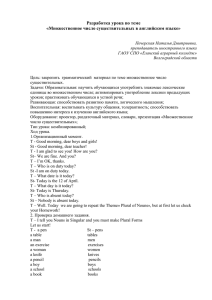
![[N[N]] - University of Oregon](http://s1.studylib.ru/store/data/005078930_1-91d3a60c2ee74894ae2e474f46cc8471-300x300.png)
